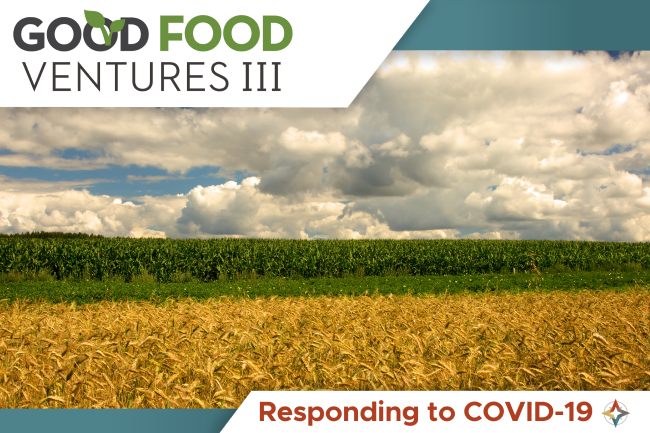Good Food Companies Step Up in Response to COVID-19

As you may know, Arabella Advisors manages an impact investing club called Good Food Ventures, which focuses on connecting investors interested in building Good Food systems with early-stage companies that are doing exactly that. In the wake of COVID-19, we’ve been thrilled to see many of these companies stepping up to contribute to relief efforts, leveraging their resources and expertise to support those in need, ease pressure on our food supply chain, provide consumers with essential goods and services, and more.
Amid the uncertainty around us, we’re writing today to share an update on some of the good these Good Food Ventures companies are doing, as well as the growth they’re experiencing as they work to serve communities across the country.
![]() Everytable, a fresh food restaurant chain that sells grab-and-go meals at varied prices based on local affordability, is working with the Housing Authority of the City of Los Angeles to deliver fresh, nutritious food to public housing sites, providing more than 62,000 meals to 2,000+ seniors and people with disabilities. Through another partnership, the company is also helping to feed caregivers on the front lines of response. It has also created a helpline for those at-risk for illness or hunger.
Everytable, a fresh food restaurant chain that sells grab-and-go meals at varied prices based on local affordability, is working with the Housing Authority of the City of Los Angeles to deliver fresh, nutritious food to public housing sites, providing more than 62,000 meals to 2,000+ seniors and people with disabilities. Through another partnership, the company is also helping to feed caregivers on the front lines of response. It has also created a helpline for those at-risk for illness or hunger.
 High Mowing Organic Seeds, the first 100-percent organic and Non-GMO Project Verified seed company in the United States, is donating seeds to various food pantries, including 9,000 packets to the Vermont Foodbank. The company also plans to donate an additional 100,000 seed packets to communities throughout its home state of Vermont and across the country, supporting food banks, community gardens, and disaster relief groups. The company is also helping local residents grow their own food, and sales have increased since last year, with online orders up nearly 500 percent in early April.
High Mowing Organic Seeds, the first 100-percent organic and Non-GMO Project Verified seed company in the United States, is donating seeds to various food pantries, including 9,000 packets to the Vermont Foodbank. The company also plans to donate an additional 100,000 seed packets to communities throughout its home state of Vermont and across the country, supporting food banks, community gardens, and disaster relief groups. The company is also helping local residents grow their own food, and sales have increased since last year, with online orders up nearly 500 percent in early April.
![]() Mercaris, an online market data subscription and trading platform for Identity-Preserved agricultural commodities such as organic and non-GMO crops, released an industry-wide research report analyzing how COVID-19 will impact the organic sector. The report addresses: the impact on producers as they look ahead to spring planting, risks to grain marketing with uncertain demand and supply chains, changes to the landscape of organic consumer demand, macroeconomic shifts that could shape organic imports, and the uncertainty surrounding the 2020 fall harvest.
Mercaris, an online market data subscription and trading platform for Identity-Preserved agricultural commodities such as organic and non-GMO crops, released an industry-wide research report analyzing how COVID-19 will impact the organic sector. The report addresses: the impact on producers as they look ahead to spring planting, risks to grain marketing with uncertain demand and supply chains, changes to the landscape of organic consumer demand, macroeconomic shifts that could shape organic imports, and the uncertainty surrounding the 2020 fall harvest.
 Seal the Seasons, an early-stage food company that partners with local farmers to grow, freeze, and package fresh fruits for consumers, has leveraged its regional production model to meet increased demand where conventional manufacturers have fallen short. The company has increased production to maintain consumer access to fruit and is expanding its product line to create greater access to a variety of produce.
Seal the Seasons, an early-stage food company that partners with local farmers to grow, freeze, and package fresh fruits for consumers, has leveraged its regional production model to meet increased demand where conventional manufacturers have fallen short. The company has increased production to maintain consumer access to fruit and is expanding its product line to create greater access to a variety of produce.
 Square Roots is an indoor urban farming company in New York that grows and sells local produce while training the next generation of farmers. It is currently packaging and donating bulk bags of produce to ReThink Food NYC, a non-profit initiative that prepares meals for those in need. Meanwhile, in Michigan, Square Roots is distributing to local restaurants who are serving customers through takeout and delivery options and directly to consumers through Gordon Food Service retail stores.
Square Roots is an indoor urban farming company in New York that grows and sells local produce while training the next generation of farmers. It is currently packaging and donating bulk bags of produce to ReThink Food NYC, a non-profit initiative that prepares meals for those in need. Meanwhile, in Michigan, Square Roots is distributing to local restaurants who are serving customers through takeout and delivery options and directly to consumers through Gordon Food Service retail stores.
 Tiny Organics, an organic baby and toddler food company dedicated to expanding access to healthy food to support child development, recently announced its collaboration with Partnership for Healthier America (PHA), a nonprofit created in conjunction with former First Lady Michelle Obama’s Let’s Move! Initiative, which is committed to improving the food supply and increasing physical activity. As a tribute to the partnership with PHA, Tiny Organics has launched a new recipe, “Michelle My Broccoli Belle.” For the month of May, 100% of proceeds from the sale of this recipe will be donated to Food Bank For New York City.
Tiny Organics, an organic baby and toddler food company dedicated to expanding access to healthy food to support child development, recently announced its collaboration with Partnership for Healthier America (PHA), a nonprofit created in conjunction with former First Lady Michelle Obama’s Let’s Move! Initiative, which is committed to improving the food supply and increasing physical activity. As a tribute to the partnership with PHA, Tiny Organics has launched a new recipe, “Michelle My Broccoli Belle.” For the month of May, 100% of proceeds from the sale of this recipe will be donated to Food Bank For New York City.
As food and agriculture companies continue to play a critical role in COVID-19 response and recovery, philanthropists and impact investors can contribute catalytic capital as well as leadership for the field on how to better rebuild our food systems. Good Food Ventures members have provided valuable insights to the field, including Margie Roswell, who draws the connection between nutrition and immunity in her latest Medium post ‘Good Nutrition is Antiviral.’
Many innovations are born out of crises, and we look forward to further exploring the entrepreneurial solutions that will help address COVID-19 and related food systems challenges. If you are interested in learning more about any of these companies or about the Good Food Ventures program more broadly, contact us.
